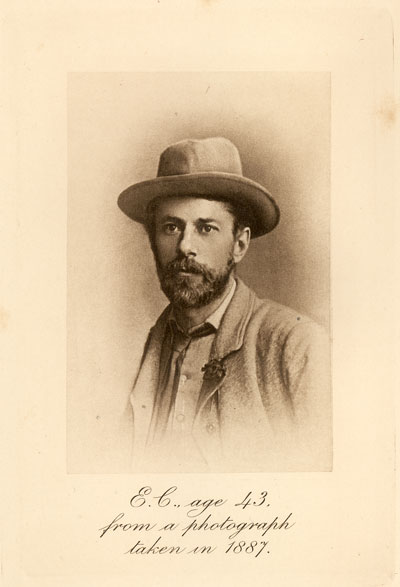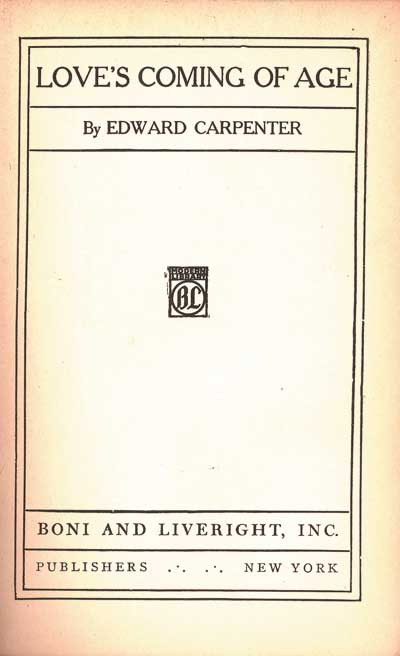Difference between revisions of "Wilson Collection: Edward Carpenter"
(Edward Carpenter) |
|||
| (10 intermediate revisions by one other user not shown) | |||
| Line 1: | Line 1: | ||
[[File:Carpenter.jpg]] | [[File:Carpenter.jpg]] | ||
| − | [[File: | + | [[File:Carpenterlovesfixed.jpg]] |
| − | ( | + | ''(Frontis portrait of Edward Carpenter from Towards Democracy: Complete Edition in Four Parts; London: Swan Sonnenschein & Co. Limited / Manchester: S. Clarke, 1907. Also shown is the title page from Love’s Coming of Age, 1911)'' |
| − | |||
| − | + | =='''Edward Carpenter'''== | |
| + | |||
| + | After visiting Walt Whitman, English Socialist Edward Carpenter concluded that the Poet “was before all a lover of the Male.”<ref>Jonathan Katz, ''Gay American History: Lesbians and Gay Men in the U.S.A.'' (New York: Thomas Y. Crowell, 1976), 365.</ref> | ||
| + | |||
| + | For Harlem Renaissance poet Countee Cullen, Carpenter's ''Ioläus'' “opened up for me soul windows.”<ref>George Chauncey, ''Gay New York: Gender, Urban Culture, and the Making of the Gay Male World, 1890-1940'' (New York: Basic Books, 1994), 284.</ref> And a peek into ''The Intermediate Sex'' was for liberationist Harry Hay an “earthshaking revelation.”<ref>Stuart Timmons, ''The Trouble with Harry Hay: Founder of the Modern Gay Movement'' (Boston:Alyson Publications, 1990), 27.</ref> | ||
| + | |||
| + | In ''Love's Coming of Age'' (1896) Carpenter wrote, “Love is...its own justification.”<ref>Edward Carpenter, ''Love's Coming of Age'' (New York: Boni and Liveright, 1911), 155.</ref> However various its “combinations,” “only in the most exceptional cases, if at all, may public institutions venture to interfere with” it.<ref>Carpenter, 155.</ref> | ||
| + | |||
| + | ==''References''== | ||
| + | <references /> | ||
| − | |||
| − | |||
| − | |||
| − | |||
| − | + | ==''To return to "Exhibit contents" links, click:''== | |
| + | ==[[Rich Wilson: Aspects of Queer Existence in 19th-Century America]]== | ||
| + | |||
| + | ==''See also:''== | ||
| + | |||
| + | ==[[Edward Carpenter and Walt Whitman: 1868-1922]]== | ||
| + | |||
| + | ==[[Jonathan Ned Katz: "Gavin Arthur Recalls Edward Carpenter," 1967]]== | ||
| + | |||
| + | ==[[Whitman, Symonds, Carpenter: "In paths untrodden," 1859-1924]]== | ||
| + | |||
| + | ==[[Jonathan Ned Katz: Resistance: 1859-1972]]== | ||
| + | |||
| + | ==[[John Addington Symonds, Edward Carpenter, and Walt Whitman: 1892-1893]]== | ||
| − | + | __NOTOC__ | |
| − | |||
| − | |||
| − | |||
| − | |||
| − | |||
Latest revision as of 20:06, 27 November 2012
(Frontis portrait of Edward Carpenter from Towards Democracy: Complete Edition in Four Parts; London: Swan Sonnenschein & Co. Limited / Manchester: S. Clarke, 1907. Also shown is the title page from Love’s Coming of Age, 1911)
Edward Carpenter
After visiting Walt Whitman, English Socialist Edward Carpenter concluded that the Poet “was before all a lover of the Male.”[1]
For Harlem Renaissance poet Countee Cullen, Carpenter's Ioläus “opened up for me soul windows.”[2] And a peek into The Intermediate Sex was for liberationist Harry Hay an “earthshaking revelation.”[3]
In Love's Coming of Age (1896) Carpenter wrote, “Love is...its own justification.”[4] However various its “combinations,” “only in the most exceptional cases, if at all, may public institutions venture to interfere with” it.[5]
References
- ↑ Jonathan Katz, Gay American History: Lesbians and Gay Men in the U.S.A. (New York: Thomas Y. Crowell, 1976), 365.
- ↑ George Chauncey, Gay New York: Gender, Urban Culture, and the Making of the Gay Male World, 1890-1940 (New York: Basic Books, 1994), 284.
- ↑ Stuart Timmons, The Trouble with Harry Hay: Founder of the Modern Gay Movement (Boston:Alyson Publications, 1990), 27.
- ↑ Edward Carpenter, Love's Coming of Age (New York: Boni and Liveright, 1911), 155.
- ↑ Carpenter, 155.

